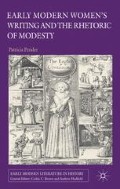Abstract
In the fourth book of the anonymous Rhetorica Ad Herennium (90s BC) — formerly attributed to Cicero and the most popular Latin rhetorical treatise of the early modern period — the author attempts to justify the unusual procedure of including excerpts of his own poetry as exempla of the rhetorical stratagems he describes. Unlike George Puttenham, who was to use this technique unabashedly in The Arte of English Poesie (1589), he must defend this decision because the authors of the Greek rhetorical handbooks that precede him typically employed conventional literary examples rather than proffering their own creative efforts: ‘And their first ground is that in doing so they are prompted by modesty, because it seems a kind of ostentation not to be content to teach the art, but to appear desirous themselves of creating examples artificially.’1 To this argument the author of the Ad Herennium provides a complex and vigorous rejoinder:
First, then, let us beware lest the Greeks offer us too childish an argument in their talk about modesty. For if modesty consists in saying nothing or writing nothing, why do they write or speak at all?… It is as if some one should come to the Olympic games to run, and having taken a position for the start, should accuse of impudence those who have begun the race — should himself stand within the barrier and recount to others how Ladas used to run, or Boiscus in the Isthmian games. These Greek rhetoricians do likewise. When they have descended into the race-course of our art, they accuse of immodesty those who put in practice the essence of the art; they praise some ancient orator, poet, or literary work, but without themselves daring to come forth into the stadium of rhetoric. I should not venture to say so, yet I fear that in their very pursuit of praise for modesty they are impudent.
(IV.ii.3)
Excusations, cessions, modesty itself well governed, are but arts of ostentation.
Francis Bacon, ‘Of Vain-glory’ from Essays (1597)
Access this chapter
Tax calculation will be finalised at checkout
Purchases are for personal use only
Preview
Unable to display preview. Download preview PDF.
Notes
Quintilian, The Institutio Oratia of Quintilian, ed. H.E. Butler (Cambridge, MA: Harvard University Press, 1960), IX.ii.47–50 (403). Further references are to this edition and are given in the text.
Cited in Jennifer Richards and Alison Thorne, eds, Rhetoric, Women and Politics in Early Modern England ( London: Routledge, 2007 ), 4.
Richard Braithwait, The English Gentlewoman, Drawne out to the Full Body (London, 1631), 89–90, cited in Richards and Thorne, 7.
Patricia Parker, ‘Virile Style,’ in Premodern Sexualities, eds Lousie Fradenburg and Carla Freccero (New York: Routledge, 1996 ), 199–222.
Kevin Dunn, Pretexts of Authority: The Rhetoric of Authorship in the Renaissance Preface ( Stanford, CA: Stanford University Press, 1994 ), 5.
Anita Obermeier, The History and Anatomy of Auctorial Self-Criticism in the European Middle Ages ( Amsterdam and Atlanta, GA: Rodopi, 1999 ), 22.
Tore Janson, Latin Prose Prefaces: Studies in Literary Convention ( Stockholm: Almqvist & Wiksell, 1964 ), 8.
Philip Sidney, The Defense of Poesie, in Sidney’s ‘The Defense of Poesy’ and Selected Renaissance Literary Criticism, ed. Gavin Alexander ( Harmondsworth: Penguin, 2004 ), 4.
Cicero, De Inventione, in De Inventione; De Optimo Genere Oratorum; Topica, trans. H.M. Hubbell (Cambridge, MA: Harvard University Press, 1989), I.xvi.22 (45).
William Shakespeare, Othello, ed. E.A.J. Honigmann (Walton-on-Thames: Thomas Nelson and Sons, 1997), I.iii.82–3. Further references are to this edition and are given in the text.
Edmund Spenser, ‘A Letter of the Authors Expounding his Whole Intention in the Course of this Worke…. To the Right noble, and Valorous, Sir Walter Raleigh,’ in The Faerie Queene, ed. Thomas P. Roche ( Harmondsworth: Penguin, 1978 ), 15.
Frank Whigham, Ambition and Privilege: The Social Tropes of Elizabethan Courtesy Theory ( Berkeley: University of California Press, 1984 ), 94.
Harry Berger Jr, The Absence of Grace: Sprezzatura and Suspicion in Two Renaissance Courtesy Books ( Stanford: Stanford University Press, 2000 ), 10.
Erasmus quoted in Patricia Parker, Literary Fat Ladies: Rhetoric, Gender, Property ( London and New York: Methuen, 1987 ), 139.
Abraham Fraunce, The Arcadian Rhetorike (London, 1588), ed. Ethel Seaton (Oxford: Basil Blackwell, 1950 ), 10.
John Hoskins, Directions for Speech and Style (London, 1599), ed. Hoyt H. Hudson (Princeton: Princeton University Press, 1935), 4. Further references are to this edition and are given in the text.
Sascha Roberts, ‘Women’s Literary Capital in Early Modern England: Formal Composition and Rhetorical Display in Manuscript and Print,’ in Still Kissing the Rod?, eds Elizabeth Clarke and Lynn Robson, Women’s Writing 12.2 (August 2007): 246–69, 248.
E.R. Curtius, European Literature and the Latin Middle Ages, trans. Willard R. Trask ( Princeton: Princeton University Press, 1953 ), 85.
Author information
Authors and Affiliations
Copyright information
© 2012 Patricia Pender
About this chapter
Cite this chapter
Pender, P. (2012). From Self-Effacement to Sprezzatura: Modesty and Manipulation. In: Early Modern Women’s Writing and the Rhetoric of Modesty. Early Modern Literature in History. Palgrave Macmillan, London. https://doi.org/10.1057/9781137008015_2
Download citation
DOI: https://doi.org/10.1057/9781137008015_2
Publisher Name: Palgrave Macmillan, London
Print ISBN: 978-1-349-34858-9
Online ISBN: 978-1-137-00801-5
eBook Packages: Palgrave Language & Linguistics CollectionEducation (R0)

